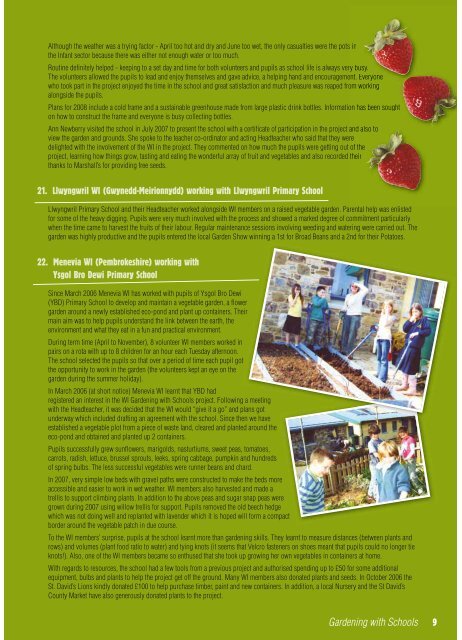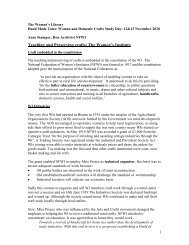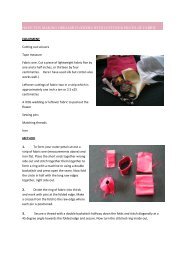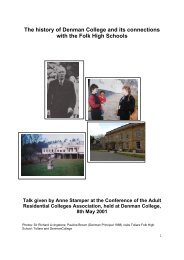case studies booklet - National Federation of Women's Institutes
case studies booklet - National Federation of Women's Institutes
case studies booklet - National Federation of Women's Institutes
You also want an ePaper? Increase the reach of your titles
YUMPU automatically turns print PDFs into web optimized ePapers that Google loves.
Although the weather was a trying factor - April too hot and dry and June too wet, the only casualties were the pots in<br />
the Infant sector because there was either not enough water or too much.<br />
Routine definitely helped - keeping to a set day and time for both volunteers and pupils as school life is always very busy.<br />
The volunteers allowed the pupils to lead and enjoy themselves and gave advice, a helping hand and encouragement. Everyone<br />
who took part in the project enjoyed the time in the school and great satisfaction and much pleasure was reaped from working<br />
alongside the pupils.<br />
Plans for 2008 include a cold frame and a sustainable greenhouse made from large plastic drink bottles. Information has been sought<br />
on how to construct the frame and everyone is busy collecting bottles.<br />
Ann Newberry visited the school in July 2007 to present the school with a certificate <strong>of</strong> participation in the project and also to<br />
view the garden and grounds. She spoke to the teacher co-ordinator and acting Headteacher who said that they were<br />
delighted with the involvement <strong>of</strong> the WI in the project. They commented on how much the pupils were getting out <strong>of</strong> the<br />
project, learning how things grow, tasting and eating the wonderful array <strong>of</strong> fruit and vegetables and also recorded their<br />
thanks to Marshall’s for providing free seeds.<br />
21. Llwyngwril WI (Gwynedd-Meirionnydd) working with Llwyngwril Primary School<br />
Llwyngwril Primary School and their Headteacher worked alongside WI members on a raised vegetable garden. Parental help was enlisted<br />
for some <strong>of</strong> the heavy digging. Pupils were very much involved with the process and showed a marked degree <strong>of</strong> commitment particularly<br />
when the time came to harvest the fruits <strong>of</strong> their labour. Regular maintenance sessions involving weeding and watering were carried out. The<br />
garden was highly productive and the pupils entered the local Garden Show winning a 1st for Broad Beans and a 2nd for their Potatoes.<br />
22. Menevia WI (Pembrokeshire) working with<br />
Ysgol Bro Dewi Primary School<br />
Since March 2006 Menevia WI has worked with pupils <strong>of</strong> Ysgol Bro Dewi<br />
(YBD) Primary School to develop and maintain a vegetable garden, a flower<br />
garden around a newly established eco-pond and plant up containers. Their<br />
main aim was to help pupils understand the link between the earth, the<br />
environment and what they eat in a fun and practical environment.<br />
During term time (April to November), 8 volunteer WI members worked in<br />
pairs on a rota with up to 8 children for an hour each Tuesday afternoon.<br />
The school selected the pupils so that over a period <strong>of</strong> time each pupil got<br />
the opportunity to work in the garden (the volunteers kept an eye on the<br />
garden during the summer holiday).<br />
In March 2006 (at short notice) Menevia WI learnt that YBD had<br />
registered an interest in the WI Gardening with Schools project. Following a meeting<br />
with the Headteacher, it was decided that the WI would “give it a go” and plans got<br />
underway which included drafting an agreement with the school. Since then we have<br />
established a vegetable plot from a piece <strong>of</strong> waste land, cleared and planted around the<br />
eco-pond and obtained and planted up 2 containers.<br />
Pupils successfully grew sunflowers, marigolds, nasturtiums, sweet peas, tomatoes,<br />
carrots, radish, lettuce, brussel sprouts, leeks, spring cabbage, pumpkin and hundreds<br />
<strong>of</strong> spring bulbs. The less successful vegetables were runner beans and chard.<br />
In 2007, very simple low beds with gravel paths were constructed to make the beds more<br />
accessible and easier to work in wet weather. WI members also harvested and made a<br />
trellis to support climbing plants. In addition to the above peas and sugar snap peas were<br />
grown during 2007 using willow trellis for support. Pupils removed the old beech hedge<br />
which was not doing well and replanted with lavender which it is hoped will form a compact<br />
border around the vegetable patch in due course.<br />
To the WI members’ surprise, pupils at the school learnt more than gardening skills. They learnt to measure distances (between plants and<br />
rows) and volumes (plant food ratio to water) and tying knots (it seems that Velcro fasteners on shoes meant that pupils could no longer tie<br />
knots!). Also, one <strong>of</strong> the WI members became so enthused that she took up growing her own vegetables in containers at home.<br />
With regards to resources, the school had a few tools from a previous project and authorised spending up to £50 for some additional<br />
equipment, bulbs and plants to help the project get <strong>of</strong>f the ground. Many WI members also donated plants and seeds. In October 2006 the<br />
St. David’s Lions kindly donated £100 to help purchase timber, paint and new containers. In addition, a local Nursery and the St David’s<br />
County Market have also generously donated plants to the project.<br />
Gardening with Schools<br />
9
















